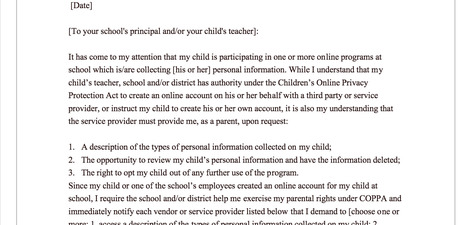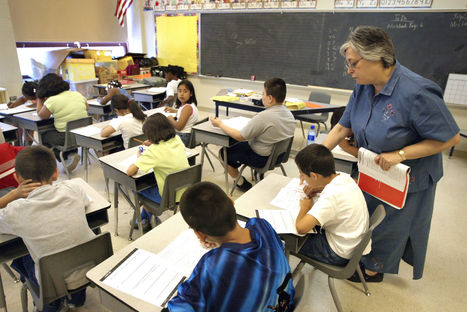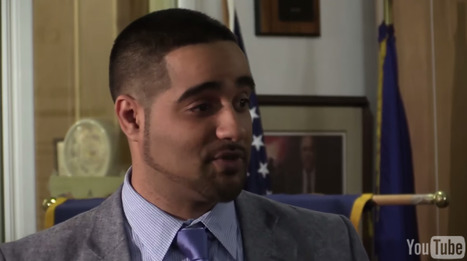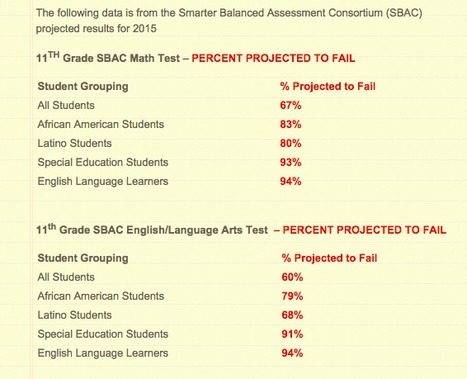 Your new post is loading...
 Your new post is loading...

|
Scooped by
Roxana Marachi, PhD
September 21, 2015 12:48 PM
|
By Nick McCrea
"AUGUSTA, Maine — After its debut year, Maine appears to be on the path to dumping its brand new statewide test meant to measure what students have learned. That means whatever state assessment comes next would be the third that Maine schools have seen in as many years. On Monday, members of the Legislature’s Education and Cultural Affairs Committee voted unanimously in favor of LD 1276, An Act To Improve Educational Assessments of Maine Students, which seeks to end the state’s membership in the Smarter Balanced Assessment Consortium. The Department of Education would issue a request for proposals to provide new tests.
“For more than a year, we have heard stories as to the pitfalls of the test, as well as the errors in it that confuse students and make taking the test a stressful and frustrating event,” said Lois Kilby Chesley, president of the Maine Education Association. She said her organization was “ecstatic” about the vote.
The bill now goes to the House and Senate for votes. “The committee understood that Smarter Balanced contract wouldn’t be renewed by the governor under any circumstance, and the political turbulence around testing this year is intense,” Rep. Brian Hubbell, D-Bar Harbor, said Monday night in an email explaining the committee’s vote.
Smarter Balanced officials said Monday night that they were “disappointed” by the committee vote. “Maine has been a leader in Smarter Balanced with hundreds of Maine teachers building the assessment,” said Tony Alpert, executive director of the assessment company. “States all over the country use Smarter Balanced because it measures critical thinking and problem solving and colleges and universities have given the test their stamp of approval. In the first year of deployment, there are always bumps in the road. We worked with Maine as issues arose and believed Maine was in an excellent position to continue giving an online, high-quality assessment like Smarter Balanced.”
This spring, the Smarter Balanced consortium issued its first official Maine test, replacing the New England Common Assessment Program, a test that Maine students in grades three through eight had been taking in reading and math since 2009. It also replaced the SAT, which had been used to test 11th-graders since 2006. The Smarter Balanced contract was $2.7 million in its first — and possibly only — year, with $900,000 in annual dues, according to acting Education Commissioner Tom Desjardins. Desjardins said there is no financial penalty for withdrawing from the consortium.
Smarter Balanced has come under fire in other states for major failures and bugs that delayed testing. In Montana, for example, a series of widespread technical problems caused the state to make the testing optional in its debut this spring. North Dakota and Nevada also reported problems.
While Maine hasn’t experienced any “major statewide disasters,” according to Desjardins, representatives of the Maine Education Association say some districts or parents have reported that students experienced “freezes” while taking the test, lost work “for no explainable reason,” or struggled with “vague and poorly worded questions.”...
For full post, click on title above or here:
http://bangordailynews.com/2015/05/18/politics/state-house/panel-votes-to-dump-smarter-balanced-school-test-after-debut-year/

|
Scooped by
Roxana Marachi, PhD
August 7, 2015 1:38 AM
|
By Superintendent Thomas Scarice of the Madison Public Schools
..."“Statistical calculations based on warped figures lead to confusion, frustration and wrong decisions.” These wise words from W. Edwards Deming are most timely as the educational community awaits the next batch of big data to be delivered, the results of the latest test promising to revolutionize schooling, the SBAC. A hollow promise, based on warped figures, that will certainly deliver hollow results. What will the SBAC data mean? Nothing. Absolutely nothing at all. Numbers in isolation, lacking story and context."...
For full post, click on title above or here:
http://ctviewpoints.org/2015/08/05/sbac-data-but-no-meaning-when-meaning-matters-most/

|
Scooped by
Roxana Marachi, PhD
July 31, 2015 11:54 PM
|

|
Scooped by
Roxana Marachi, PhD
May 14, 2015 8:55 PM
|
"The era of the bubble test is over. In California and across the nation, public schools have scrapped the traditional pencil-and-paper standardized tests that had become an annual rite of passage for children. Testing hasn’t gone away. But it has gone high-tech. For the first time in California’s history, millions of students will be taking the Smarter Balanced online assessments. The computerized test – known as the California Assessment of Student Performance and Progress, or CAASPP – is intended to measure how students in third through eighth grade and 11th grade are learning Common Core, the new academic standards in math and English-language arts adopted here and in 42 states.
“This is the future,” said Pam Slater, a spokeswoman for the California Department of Education. “The future isn’t pencil and paper anymore.”
Schools have been given a choice about exactly when to administer the tests during the last three months of the school year. While some California schools began as early as mid-March, most Orange County schools started assessing in late April or will begin this month, said Christine Olmstead, assistant superintendent for instructional services at the Orange County Department of Education. At any given school, students from different grades may take tests during different weeks, depending on the number of computers available on campus."... For full post, click on title above or here: http://www.ocregister.com/articles/test-660129-tests-students.html

|
Scooped by
Roxana Marachi, PhD
May 12, 2015 9:43 PM
|
"Connecticut currently mandates the testing of public school students in grades 3, 4, 5, 6, 7, 8, and 11 with standardized tests produced by the Smarter Balance Assessment Consortium (SBAC). I am opposed to SBAC testing for English language arts because those tests neither measure authentic achievement nor foster students’ growth as readers, writers, and thinkers. Here are 10 reasons to STOP the harmful SBAC testing. 1. SBAC tests are not rigorous. The tests do not demand complex thinking. The tests are aligned to the Common Core standards, and the content of the Common Core Standards for English Language Arts is inferior content which does not serve to develop students as motivated, engaged readers and effective writers. 2. SBAC tests are not field-tested for college and career readiness. No one knows if a good score indicates that a student will be successful in college or careers or if a poor score indicates that a student will struggle in college or careers. According to Joseph Willholt, executive director of SBAC, there is a “large validity question “ about the tests in regard to college readiness. 3. The SBAC tests do not measure the skills students will need for the global workforce. Those needed skills are: to pose and shape critical questions, to collaborate with others of different cultures and points of view, to communicate effectively orally and in writing, and to use meta-cognitive skills (learning how to learn skills) when facing new problems. Other countries with which we compare ourselves measure those skills because they have standards for them, but we have neither the standards to teach those skills nor the SBAC tests to measure them. 4. SBAC tests are not developmentally appropriate. The Common Core English Language Arts Common Standards were not written by educators or those with knowledge of child and adolescent development. They were written by employees of testing companies. The content of the standards and of the SBAC tests is simply what test makers determined could be measured on standardized tests, not what is appropriate for students to learn or what fosters student growth as readers, writers, and thinkers. The National Council of Teachers of English did not endorse the Common Core because of the content of those standards, the content SBAC tests measure. 5. SBAC tests are capriciously graded. The passing grade on the tests is arbitrarily set. On the high school SBAC tests, the passing grade is set such that 70% of students will be labeled as failing the math portion and 60% labeled as failing the English portion. The passing grade on SBAC has been set at what the highly respected National Assessment of Educational Progress considers a B+/ A- performance. SBAC labels all those who score a B or lower as failures. SBAC tests serve to widen the achievement gap. The more time students spend preparing for SBAC tests, the less education they will have in authentic literacy learning. Time spent in test prep for SBAC robs students of reading, writing, and collaborating experiences which develop literacy skills. Schools with a history of low test scores spend concentrated time on test prep; schools with traditionally high test scores do not spend time on test prep. Therefore, the gap between those graduates with genuine skills in reading, writing, and collaborating will widen with students of privilege receiving a notably better education than students in schools with historically low test scores. 6. SBAC tests discriminate against Connecticut’s neediest students. Since all standardized test scores correlate with family income, many children of poverty will fail. How long will students be motivated to learn and how long will they stay in school if they fail tests in 3rd grade, 4th grade, 5thgrade, 6th grade, 7th grade, and 8th grade? Not only are impoverished students receiving a poor education with Common Core but their dropout rate will also increase. 7. SBAC tests narrow the curriculum. Preparing students for SBAC tests requires a high school English curriculum that strictly adheres to the Common Core. That adherence severely limits what students read, what thinking skills they learn as readers, what students write, and what kind of thinking skills they learn as writers. Common Core limits the amount of literature read and totally eliminates teaching students the skills of questioning, making text connections to themselves and their world, and analyzing multiple and divergent interpretations that reading literature offers. None of those skills are assessed on the SBAC test so are not part of the test prep curriculum many schools have adopted. Similarly, that test prep curriculum does not develop students as writers and thinkers. High school students are tested only on how they write formulaic arguments, graded either by computers or hourly employees hired through Craig’s List and not required to have knowledge about the craft of writing. Therefore, students do not have a curriculum rich in writing experiences which develop their inductive, explorative, and narrative thinking – all keys to success in higher education and the workplace. 8. SBAC tests encourage poor pedagogy. Because of the high stakes of the SBAC tests, English teachers, especially in schools with a history of low standardized test scores,, prepare students for the test by adhering to the pedagogy prescribed by the Common Core. It, however, is a flawed and discredited pedagogy prevalent in the 1940’s and 50’s and does nor prepare students to think complexly. Not only does that pedagogy severely restrict students’ development as readers and writers, it discourages many of them from even wanting to become readers and writers. 9. SBAC tests will not “level the playing field”. Connecticut is already doing well with literacy education. Connecticut ranks higher than 62 nations in the reading performance of 15 year olds (according to the 2012 PISA- Program of International Student Assessment) and ranks highest in the country in reading performance of high school seniors (according to NAEP, the nation’s most authoritative measure of academic performance in reading and math). If standardized tests are thought to give us useful information, we already have that information. We know that affluent areas of Connecticut provide an unparalleled education for their students, and we know that where students are impacted by poverty and racism, those students suffer. To level the playing filed, we need to provide for impoverished students what their more privileged peers have been given and standardize opportunities for learning for all students. 10. SBAC tests teach the wrong values. The tests teach children that competition, beating out other schools and other students, is what matters instead of the student’s own learning, the student’s own passion for ideas, the student’s own growth as a thinker, a reader, and a writer. Connecticut educators can design assessments which measure the achievements students really need for their future. I have done considerable work with teachers in both affluent and impoverished districts to design assessments that measure critical thinking, creative thinking, collaboration, and oral and written communication for students of all abilities. Student achievement always exceeds original expectations when teachers are invited to do this work. We CAN improve achievement in Connecticut for ALL of our students but not with SBAC tests." http://reallearningct.com/2015/05/11/say-no-to-sbac/

|
Scooped by
Roxana Marachi, PhD
April 19, 2015 4:41 PM
|
"Nearly 200 colleges and universities in six states have agreed to let students skip remedial coursework if they reach the college-readiness score on the 2015 Smarter Balanced assessment.
Wednesday's announcement marks a major development in the consortium's bid to convince higher education to accept the "college-ready" cut score on its 11th grade test for course-placement purposes. Until this week, it had only the state college and university systems in two states signed on. Now that list has grown to 197 campuses in six states."...
For full post, click on title above or here:
http://blogs.edweek.org/edweek/curriculum/2015/04/sbac.html

|
Scooped by
Roxana Marachi, PhD
April 11, 2015 1:58 PM
|
"Third-grade teacher Annie Long grappled with a new problem when her students reviewed the online practice test to prepare for the Common Core-aligned assessments they will be taking in a few weeks. The instructions were too complicated for many of them to understand. The practice test instructions included words such as “scan” and “sources” – words that were unfamiliar to the majority of her class at Bayshore Elementary School in Daly City. But they were not the only students struggling with these elements of the practice test. High school students in San Jose interviewed by EdSource Today also had difficulty understanding the instructions and how to navigate different sections of the test, as did 3rd-graders in Fresno. The online practice test includes about 30 sample exercises of varying difficulty for each grade level in math and English language arts, according to the website of the Smarter Balanced Assessment Consortium, which developed it and the end-of-the year assessments. Over 3 million students in grades 3 to 8 and 11 will take the required assessments this spring to measure their performance in these two subject areas. Educators like Long worry that overly complicated instructions could interfere with students’ ability to get through the full battery of tests they will be taking over the next several weeks unless they have previously been given substantial help to understand them. Students won’t receive a score on the practice test. But it gives them a preview of the types of test items they will see on the required Smarter Balanced assessments, which will be completely online for the first time."... For full post, click on title above and here: http://edsource.org/2015/students-struggle-to-get-past-instructions-on-practice-tests

|
Scooped by
Roxana Marachi, PhD
March 14, 2015 11:07 PM
|

|
Scooped by
Roxana Marachi, PhD
February 28, 2015 2:08 AM
|

|
Scooped by
Roxana Marachi, PhD
February 26, 2015 10:18 PM
|
by Jesse Hagopian
"Today, I found out from my good friend Doug Edelstein that his school community decided to collectively refuse to administer the new Common Core test, the SBAC, to 11th graders. Doug teaches at, and graduated from, Nathan Hale (in fact, my step-dad was a classmate of his). The Nathan Hale Senate–a body made up of the teachers, administrators, parents and students–voted nearly unanimously that this test was inappropriate. The vote was taken after careful consideration and much discussion and inquiry, including two school community forums — one of which included University of Washington professor of education and renowned scholar on high-stakes testing, Wayne Au (http://www.rethinkingschools.org/ProdDetails.asp?ID=9780942961515). This is the first year that the SBAC is required in the Seattle Public Schools, and this action represents an escalation of the high-stakes testing resistance that erupted against the MAP test in 2013. In taking this action, Nathan Hale has became the latest focal point of what has now become the largest ongoing revolt against high-stakes testing in U.S. history and an important new escalation in the national resistance to common core testing. Doug wrote the following announcement of Nathan Hale’s courageous decision to take a stand against the testocracy: This afternoon the Nathan Hale Senate (functions as Building Leadership Team) voted nearly unanimously not to administer the SBAC tests to 11th graders this year. The Senate also recently voted not to administer the PSAT test to 10th graders at all in the future. Reasons for refusing the SBAC for 11th graders included (summary):
1. Not required for graduation
2. Colleges will not use them this year
3. Since NCLB requires all students pass the tests by 2014, and since few if any schools will be able to do that, all schools will therefore be considered failing by that standard. There is thus no reason to participate in erroneous and misapplied self-labeling.
4. It is neither valid nor reliable nor equitable assessment. We will use classroom based assessments to guide next instructional steps.
5. Cut scores of the SBAC reflect poor assessment strategy and will produce invalid and unreliable outcomes.
6. Student made this point: “Why waste time taking a test that is meaningless and that most of us will fail?”
7. The SBAC will tie up computer lab time for weeks.
8. The SBAC will take up time students need to work on classroom curriculum. This is an important step. Nathan Hale is asserting its commitment to valid, reliable, equitable assessment. This decision is the result of community and parent meetings, careful study of research literature, knowledge of our students’ needs, commitment to excellence in their education, and adherence to the values and ideas of best-practice instruction." For full post, click on title above or here: http://iamaneducator.com/2015/02/24/new-seattle-test-boycott-erupts-nathan-hale-high-school-votes-to-refuse-to-administer-a-common-core-test/

|
Scooped by
Roxana Marachi, PhD
November 27, 2014 12:49 AM
|
"Student Privacy Matters has recently posted information to support parents in understanding how they can exercise their rights to protect their children’s privacy under federal law. As we have reviewed the documents there are a couple things that stand out as absolutely urgent for all parents to know. First, for parents of children under age 13, you have the right to review and REFUSE any online programs and online testing that your child is using – programs in which your child is entering the data (this does NOT include online programs the teacher is using to enter student data). The Children’s Online Privacy Protecting Act (COPPA) allows parents to control what information is collected online from their children twelve and under. Therefore, as a parent, you have a right to find out what information is being collected, you can review what information is being collected, and you can REFUSE to allow your child to participate in the online program. You can simply opt your child out of the program – or the online test. This has serious implications for the Opt Out movement. As PARCC and SBAC and other online tests roll out we have a national strategy that can be used, for all children under age 13, as we opt out/refuse the tests. Currently, any other online programs and online testing in use for under age 13 can be halted. We know that there will be many questions to answer as we move forward with this strategy – understand that the only way to get our questions answered is to try it. Let’s do this.Parents also have rights under FERPA (although those rights have been reduced thanks to the US Dept of Ed). Rights include inspecting and correcting information in your child’s records and more – see here at Student Privacy Matters. Parents have additional rights under PPRA in regard to federally funded surveys and more – see this link for more information. For an overview of all information please see this link at Student Privacy Matters (there are additional forms and strategies to use at their website, so we recommend taking time to review them all). In addition, there are concerns for teachers who are allowing children to participate in online programs and/or online testing without parental consent – it may be viewed as forgery of parental consent – see this link starting at 14 minutes for more information – this might prove useful for teachers who refuse to administer tests and/or online curriculum. The UOO team is very grateful for all the work Student Privacy Matters has done to protect the privacy of our children and end the data mining that is being used to privatize our public schools. Many many thanks.
Here is the COPPA opt out form taken directly from the Student Privacy Matters website at www.studentprivacymatters.org. This form will instruct your child’s school/district to contact the vendors/service providers (online curriculum and test programs) on your behalf. Student Privacy Matters states that you must keep all your records in case you need to file a complaint."...
For full website, click on title above or here:
http://unitedoptout.com/2014/11/16/urgent-national-update-opt-out-of-all-online-testing-and-online-curriculum-for-under-age-13/

|
Scooped by
Roxana Marachi, PhD
October 3, 2013 9:29 PM
|
"The Common Core State Standards now being implemented in most states and the District of Columbia will soon be accompanied by new standardized tests being developed by two multi-state consortia — the Smarter Balanced Assessment Consortium (SBAC) and the Partnership for Assessment of Readiness for College and Careers (PARCC) — with $360 million in federal funds. Education Secretary Arne Duncan has said repeatedly that he expects these exams, due to be rolled out in 2014-15, to go beyond the familiar multiple-choice standardized tests students have been forced to take for more than a decade and to be an 'absolute game-changer in public education.'
Is he right? Not so much. Here are seven myths and realities about the new tests, from FairTest, or The National Center for Fair & Open Testing, a nonprofit organization dedicated to ending the misuse of standardized tests. You can find more here on FairTest’s website. - Valerie Strauss
Full WP Post at: http://www.washingtonpost.com/blogs/answer-sheet/wp/2013/09/04/seven-facts-you-should-know-about-new-common-core-tests/
|

|
Scooped by
Roxana Marachi, PhD
September 16, 2015 6:59 PM
|

|
Scooped by
Roxana Marachi, PhD
August 1, 2015 6:52 PM
|
By Mike Klonsky (Schooling in the Ownership Society)
"McGraw-Hill/CBT is pulling out of the $1.1 billion high-stakes testing market. The reason? Too much volatility. It seems that the wave of political protests and the parent opt-out movement have forced McGraw to move to greener more peaceful pastures. And, as the common-core tests have rolled out, the overall market for state assessments has largely flatlined.
According to EdWeek:
'The market has also proved volatile, fraught with legal protests, mounting opposition from parents and politicians to testing, and major disruptions in online assessments for which vendors, including McGraw-Hill Education/CTB, have been blamed.
Let’s be clear—people in the assessment industry are not living in poverty,” said Scott Marion, the associate director of the National Center for the Improvement of Educational Assessment, which consults with states and districts on testing. Yet the profit margins, he said, are “thinner than a lot of people want to believe.'
McGraw-Hill apologized in 2013 for interruptions after its digital testing service disrupted exams in Indiana and Oklahoma. About 3,000 students in Oklahoma lost their connections to the testing provider’s servers. And nearly 80,000 out of a half million Indiana students who took the company’s tests in the spring had their testing postponed and about 30,000 were kicked off of the testing platform on a single day of testing. One Indiana charter school has said the errors are to blame for its F grade from the state.
Twenty years ago, McGraw-Hill Education, Harcourt, and Riverside Publishing controlled large portions of the summative-testing market. Today, all of those companies have either largely abandoned that market or been absorbed by other testing entities."...
For full post, click on title above or here:
http://schoolingintheownershipsociety.blogspot.com/2015/07/mcgraw-hill-folds-it-cards-cant-compete.html

|
Scooped by
Roxana Marachi, PhD
June 10, 2015 3:24 AM
|

|
Scooped by
Roxana Marachi, PhD
May 13, 2015 11:31 PM
|
Click on image, title or here to view video https://edpuzzle.com/media/5553ae9ceb38f9e7657e9f00 _____________________________________________________________________
[Press Conference on SBAC Testing: Opt Out Movement Biggest in Seattle's History recorded April 7, 2015 at the Seattle NAACP Headquarters in Seattle, WA.] [Segment starts at 7:00Minutes from original video] ..."The SBAC testing in Seattle has been an unmitigated disaster. We have had reports across this city of absolute testing meltdown in building after building. You're going to hear today from some of the people who have experienced that first hand. They've experienced the technological gliches that have wasted hours of instructional time. They've experienced their computer labs and their libraries shut down for weeks at a time and unable to be used for research. And they've experienced the human disaster of labeling kids failing and seeing the impact that that has on children and crushing their spirits, turning them off to education... and you'll hear that I think in graphic detail.
But, I want to make one thing clear today. Teachers in the Seattle Public schools are not against tests. In fact teachers invented tests and we rely on assessment to understand our students' thought process and help scaffold their understanding to the next level of their development in a given subject. And to that end the teachers Garfield High School have built a partnership with the New York Performance Based Assessment Schools. And you're going to hear more about that partnership from a colleague of mine so you can really understand what authentic assessment means.... what the leaders in research across the country will tell you about authentic assessment and a little bit about the project that Garfield is undergoing to replace these tests with truly authentic measures... things that get at critical thinking skills, because I think we have made a grave error in our society today. We are training our nation of youth to believe that wisdom is the ability to eliminate a wrong answer choice rather than to think critically, to question, to be creative, to imagine, to collaborate, to identify a problem in your community and work together with someone else to solve it, that's what our schools should be about, not bubbling in a,b,c, or d. I want to say that these tests are invalid... the SBAC test is invalid. That's a bold statement. How can I make that claim? It's not based on my own estimation. It's based on the SmarterBalanced Consortium itself. The SmarterBalanced Consortium has acknowledged in a memo, that the test has not been proven to be externally valid. And yet our state rushed to implement this test all across the state?".... Shortened video is at: https://edpuzzle.com/media/5553ae9ceb38f9e7657e9f00 Original [full] video link is below (segment starts at 7mins) https://youtu.be/rT3hFSuBAqc?t=7m1s 
Video also embedded in this full critique of the SBAC: Critical Questions about Computerized Assessments and SmarterBalanced Tests: http://eduresearcher.com/2015/07/06/critical-questions-computerized-testing-sbac/

|
Scooped by
Roxana Marachi, PhD
May 7, 2015 12:59 AM
|

|
Scooped by
Roxana Marachi, PhD
April 16, 2015 2:05 PM
|
"Nevada’s students haven’t been able to take computerized standardized tests since Tuesday morning because of technical problems.
According to the Nevada Department of Education, a spike in students taking the Smarter Balanced Assessment (SBAC) this morning in Nevada, Montana and North Dakota exceeded the data capacity of Measured Progress, a third-party vendor contracted by the states to provide the test.
All testing in the three states has been stopped until Measured Progress can increase its data capacity, according to an email sent to state superintendents today by state deputy superintendent Steve Canavero."...
For full post, click on title above or here:
http://lasvegassun.com/news/2015/apr/14/computer-glitch-halts-common-core-testing-nevada/

|
Scooped by
Roxana Marachi, PhD
March 17, 2015 12:57 PM
|
A RESOLUTION OF DISAPPROVAL OF THE SMARTER BALANCED ASSESSMENT
WHEREAS, the motto of Mariner High School is to “provide an excellent education to every student;” and
WHEREAS, the Smarter Balanced Assessment is not required for graduation; and
WHEREAS, this computer based assessment will take approximately eight hours for each 11th grader to complete and its confusing format is unlike anything students will experience outside the testing environment; and
WHEREAS, there are not enough computers to test the students in a reasonable amount of time and it is unacceptable for computers to be unavailable to non-testing students for such a long period of time; and
WHEREAS, the failure rate of the assessment is going to be extraordinarily high (possibly 60%) for the general population and even higher for students of color, ELL students, and students on individualized education plans; and
WHEREAS, student performance on this test will in no way be indicative of their learning and instead this test must be given to meet arbitrary, antiquated and poorly considered state/federal mandates; and
WHEREAS, graduation and standardized testing requirements in Washington State are in constant shift, confusing, and poorly communicated; and
WHEREAS, the sheer number of state mandated standardized tests is unacceptable; in addition to other assessments during the last seven weeks of school we must administer two weeks of AP testing, many weeks of 11th grade SBA testing, the 10th grade ELA exit exam, the Biology EOC exam, the Geometry EOC exam, and the Algebra 1 EOC exam; many of these exams are required for graduation or could possibly earn students college credit; moreover, during this time we are also required to teach our students and administer year end finals and
projects; and
WHEREAS, the detrimental impact on the school schedule and more importantly student learning cannot be justified simply to meet a superfluous bureaucratic requirement; now, therefore, be it
RESOLVED, the members of the Mukilteo Education Association at Mariner High School object to the administration of the 11th grade Smarter Balanced Assessment for spring 2015 as an unacceptable obstruction to providing an excellent education to every student.
This passed unanimously on March 6, 2015."... For full post, click on title above or here:
https://seattleducation2010.wordpress.com/2015/03/16/sbac-resistance-in-washington-state-is-growing/

|
Scooped by
Roxana Marachi, PhD
March 9, 2015 1:35 AM
|
Selected quote: "It was created for imaginary children who exist only in the minds of the people who made the tests. These imaginary third through fifth graders are perfectly willing and able to sit still and focus for forty-five minutes, type, problem-solve random computer glitches, and effortlessly switch between two or more open windows at the same time. They can easily resist the temptation to just switch tabs on their browser and do something fun instead. Also, they have access to imaginary huge monitors." For full post, click on title above or here:
https://seattleducation2010.wordpress.com/2015/03/08/what-i-learned-taking-the-smarter-balanced-sbac-test/

|
Scooped by
Roxana Marachi, PhD
February 28, 2015 1:49 AM
|
Selected quote: "... considering that many of the world’s greatest scientists, authors, actors, teachers and leaders were once English Language Learners one would think the public education system in the United States would be designed to promote and support opportunities for those who need extra help learning the English Language. Moreover you would think education policymakers would be working to find ways to take advantage of the opportunities that having a multilingual population present.
But instead, the Corporate Education Reform Industry and their supporters are pushing a political agenda that actually seeks to isolate and discriminate against the overwhelming majority of students who face any sort of challenge, including those who aren’t yet fluent in the English language. The fundamental discriminatory nature of the Common Core testing program is yet another example of the insidious and detrimental approach that the corporate elite call “education reform.” Take for example the situation here in Connecticut. Faced with a growing revolt against the discriminatory, unfair and inappropriate Common Core Smarter Balanced Assessment Consortium (SBAC) test, Connecticut Democratic Governor Dannel Malloy issued a press release yesterday in defense of the Common Core SBAC test saying,
“Tests are important tools in the teaching and learning toolbox that helps track student progress towards success in college and careers.”
Yes Governor Malloy, tests are important tools, but the Common Core SBAC test is not a mastery test or even a useful tool in the “teaching and learning toolbox.” Instead it is a computer-based standardized testing system that is specifically designed in such a way as to intentionally define the vast majority of public students as failures. Among the Common Core SBAC test’s greatest failure is its utter contempt for English Language Learners – students that are not presently proficient in the English language. Rather than focus on developing the teaching and learning tools to ensure English Language Learners succeed, the Common Core SBAC test is a mechanism to label ELL students, and the educators who teach them, as failures."... For full post, click on title above or here: http://jonathanpelto.com/2015/02/24/more-than-90-of-english-language-learners-projected-to-fail-common-core-sbac-test/

|
Scooped by
Roxana Marachi, PhD
January 31, 2015 3:43 AM
|
By Jonathan Pelto "Teachers, Parents, Public School Advocates, it is probably best to sit down for this one…
That bizarre and disturbing statement was the headline in a piece recently posted by the Connecticut Education Association (CEA) following this week’s meeting of a Connecticut State Department of Education Working Group. Reporting on the event, the CEA explained; “Details are emerging about how the new Smarter Balanced Assessment Consortium (SBAC) program will affect students, teachers, and communities.” Wait? “Details are emerging”? The Common Core Standardized Testing Scam, known as the Smarter Balanced Assessment consortium (SBAC), is actually designed to ensure that about 70 percent of Connecticut students fail."... ..."Not only is the Common Core testing system created to generate the false impression that Connecticut and the nation’s public education system is failing, but by tying the Common Core SBAC test results to the new inept, illogical and counter-productive Connecticut Teacher Evaluation System, the incredibly expensive “golden nugget” of the corporate education reform industry aims to denigrate teachers and blow apart what is left of the teaching profession. But despite this truth, Governor Dannel Malloy and his administration remain wedded to the implementation of the Common Core, the Common Core standardized testing program and a teacher evaluation process based on the results of those tests. As the CEA’s January 21 2014 blog post explains, “Most school districts in Connecticut administered a field test last year, but this year the program will be in high gear with educators administering the tests to students in grades 3-8 and 11 this April/May. […] This year, the stakes will be high as students establish a baseline for the test. Jacqueline King, who works for the SBAC program, says the baseline data about Connecticut students’ performance on the first-time test has the “potential to shock” students and their families.”... For full post, click on title above or here: http://jonathanpelto.com/2015/01/22/common-core-sbac-results-may-provoke-shock-officials-urge-families-stay-objective/

|
Scooped by
Roxana Marachi, PhD
September 10, 2014 3:12 AM
|
Two highlights of this post (By Mercedes Schneider):
"In September 2010, two assessment consortia “won” federal Race to the Top (RTTT) money for the “design, development, and evaluation of the assessment system” known as Race to the Top Assessment (RTTA): The Smarter Balanced Assessment Consortium (SBAC) and the Partnership for Assessment of Readiness for College and Careers (PARCC).
PARCC received $170 million, and SBAC, $160 million, plus an additional $16 million to each consortium to “support efforts to help participating States successfully transition to common standards and assessments.”
Their award letters can be found here for PARCC and here for SBAC. In the award letters, both PARCC and SBAC were expected by January 7, 2011, to “negotiate and complete a final cooperative agreement” with the federal government regarding the usage of the “common standards” assessments.
The fine print for taking college-and-career-ready dough from the feds.
Both cooperative agreements can be found here for PARCC and here for SBAC.
I have heard individuals ask about whether one of the requirements of the Common Core State Standards (CCSS) is the release of student-level data to the federal government. I have heard pro-CCSS officials dismiss this idea as unfounded. Not so.
PARCC and SBAC are the federally-funded, CCSS-assessment consortia. In order to receive those federal millions for CCSS assessment development, both consortia had to agree to deliver student-level data to USDOE."
. . .
"One more item for this post:
As education historian Diane Ravitch noted in her September 8, 2014, interview with Tavis Smiley, USDOE is using the CCSS assessment consortia it has funded as vehicles to push school districts into pouring money into technology (Item 7):
An eligible applicant awarded a grant under this category must—
Use technology to the maximum extent appropriate to develop, administer, and score assessments and report assessment results. [Emphasis added.]
What is baffling is that those who complain about the amount of money spent on American education in the wake of dissatisfying international test results are now pushing a test-driven reform that requires additional billions in technology expenditures (see also here and here and here) but that is expected to flunk more kids."...
|



 Your new post is loading...
Your new post is loading...







![[Nearly 200] Universities in Six States Agree to Smarter Balanced Definition of 'College Ready' // EdWeek | "Testing, Testing, 1, 2, 3..." | Scoop.it](https://img.scoop.it/gjMcthxEuCRNUw59JUUZ6Dl72eJkfbmt4t8yenImKBVvK0kTmF0xjctABnaLJIm9)
















